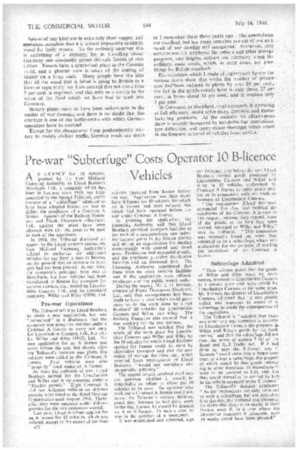Pre-war "Subterfuge" Costs Operator 10 13-licence Vehicles
Page 34

If you've noticed an error in this article please click here to report it so we can fix it.
A:Et LICENCE for 10 vehicles,
granted by the East Midland Licensing Authority to Lloyd Brothers (Haulage), Ltd., a company which has been in business since 1919, has been cancelled by the Appial Tribunal, partly because of a "subterfuge" admitted to have been adopted before the war to defeat the conditions of a Contract A licence. Appeals of the 'Railway Executive and Frank Thompson (Hauliers), Ltd„ against the grant have been allowed, with £31 10s. costs to be paid to each of the appellants.
In 1938, the Tribunal dismissed an appeal by the Lloyd concern against the East Midland Licensing Authority's refusal to authorize six additional vehicles for use from a base at Boston, on the ground that an increase in business had not been proved. At that time, the company's principal base was at Blackburn, but four vehicles had been transferred to Boston for transport for various canners, etc., including Lincolnshire Canners, Ltd., and its associated company, Willer and Riley (1910), Ltd.
Pre-war Operations
The Tribunal left it to Lloyd Brothers to make a new application, but was " concerned" at a disclosure that the company was using five vehicles under a Contract A licence to carry not only for Lincolnshire Canners, Ltd., but also for Willer and Riley (1910), Ltd. No new application for an A licence was made before the war, but shortly after the Tribunal's decision was given, five vehicles were added to the Contract A licence. Four vehicles were also " properly" used under an A licence.
As from the outbreak of war, Lloyd Brothers carried for the Lincolnshire and Willer and Riley concerns under a "blanket permit." Eight Contract A id two A-licence vehicles on defence permits were hired to the Road Haulage Organization until August. 1946. Thereafter they were operated under defence permits for the two customers named.
Last year, Lloyd Brothers applied for an A licence for 15 vehicles, which was refused, except to the extent of the four vehicles operated from Boston before the war. Application was then made for a B licence for 10 vehicles, for which an A licence had been refused, but which had been operated before the war under Contract A licence.
In granting the application, the Licensing Authority said that Lloyd Brothers provided transport facilities at the start of a comparatively new industry (canned peas) in the Boston district and set up an organization for dealing economically with canned and dried peas. Production had expanded greatly, and the applicant provided distributive fabilities and an increased fleet. The Licensing Authority considered that there were no other suitable facilities and if the application were refused, producers and the public would suffer.
During the inquiry, Mr. L. G. Brittain, director of Frank Thompson (Hauliers), Ltd., said that arrangements had been made to form a pool which could guarantee to do the work done by Lloyd Brothers' 10 vehicles for Lincolnshire Canners and Willer and Riley. The .Railway Executive also showed that it was working for the two canners.
The Tribunal was satisfied that the whole of the work done for Lincolnshire Canners and Willer and Riley by the 10 vehicles for which Lloyd Brothers applied for licence could be done by alternative transport and that the provision of storage facilities, etc., which resulted from employment of Lloyd Brothers. "would not constitute any insuperable difficulty."
The appeal largely resolved itself into the question whether it would. be inequitable to refuse to allow the 10 vehicles to be used. An operator who took out a Contract A licence could not, states the Tribunal's written decision, plead that, because he had done work under that licence, he should be granted an A or B licence. In such a case, he was in the position of a newcomer.
It was established and admitted, says the Tribunal, that before the war, Lloyd Brothers carried goods produced by Lincolnshire Canners and Willer and Riley in 10 vehicles authorized by Contract A licence to carry goods only for or in connection with the trade or business of Lincolnshire Canners.
"The respondents [Lloyd Brothers] contended that they had fulfilled the conditions of the Contract A licence in this respect, because, they argued, none of the goods, at the time they. were carried, belonged to Willer and Riley," says the Tribunal. "This contention was avowedly based on what they admitted to be a subterfuge, which was undertaken for the purpose of evading the conditions of the Contract A licence.
Subterfuge Admitted
"Their witness stated that the goods of Willer and Riley were, by book entries, invoiced to Lincolnshire Canners at a certain price and were resold by Lincolnshire Canners at the same price. Mr. Francis; the director of Lincolnshire Canners, admitted that it was grossly unfair and improper to resort to a subterfuge to evade the consequences of the regulations. .. .'"
The Tribunal is " satisfied that there was never any real intention to transfer to Lincolnshire Canners the property ip Willer and Riley's goods by the book entries," and that the subterfuge did not meet the terms of section 7 (1) of the Road and Rail Traffic Act. If it had done so, says the Tribunal, any C licensee "could enter into a bogus contract or adopt a subterfuge, the purport of which would be that goods belonging to some merchant or manufacturer were to be invoiced to him, and that they could thereafter be carried by him in his vehicle operated under C licence."
The Tribunal's decision continues: "As the respondents not only connived at such a subterfuge, but are defending it to this day, the Tribunal can recognize no claim that there is an equity in their favour, even if, in a case where the alternative transport is adequate, such an equity could have been 'pleaded."












































































